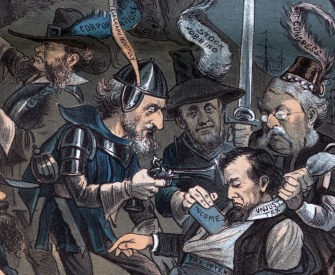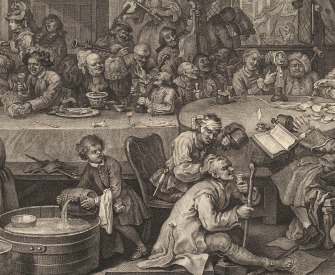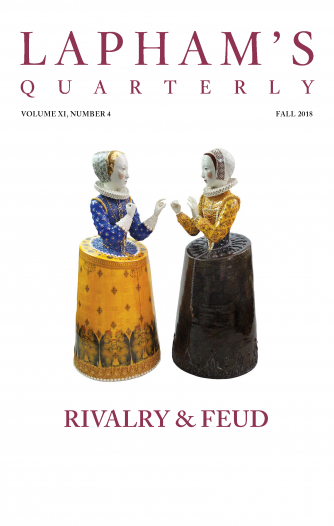How the Emperor Justinian ruined the beauty and appearance of Constantinople and every other city, we shall now see.
All of the taxes, which the municipalities had devoted to public use or entertainments, he transferred arbitrarily to the imperial treasury. No consideration was now given to any physician or teacher; no one dared pay any attention to public buildings; there were no public lights in any city, nor any entertainments for the citizens. For the theaters, hippodromes, and circuses, in which his wife Theodora had been born, bred and educated, were all discontinued. Later he even stopped the public spectacles in Constantinople, to avoid spending the usual state money on them, by which an almost incalculable number of people had got their livelihood. On these, individually and collectively, ruin and desuetude descended, and as if some cataclysm had fallen on them from heaven, their happiness was slain. And no other subject was spoken of among men, at home or in public or in the churches, than their calamities, their sufferings, and their overwhelming by the latest misfortune. Such was the state of affairs in the cities.
Of what is left to tell, this is worth mentioning. Each year two Roman consuls were appointed: one at Rome, the other at Constantinople. And whoever was called to this honor was expected to spend more than twenty gold centenaries on the public, some of which came from the consul’s private purse, but most was furnished by the emperor. This money was given to those others whom I have mentioned, but mostly to the poor and those employed in the theater, all of which was to the good of the city. But from the time Justinian came to power, these distributions were not made at the customary time, for sometimes a consul remained in office for year after year till finally people wearied of hoping for a new one, even in their dreams. As a result, universal poverty was the case, since the usual annual relief was no longer afforded to subjects, and in every way all that they had was taken from them by their ruler.
Now let us see what he did to those in need of alms: the poor, the beggars, and the diseased.
First, as I have said, he took control of all the shops, licensed monopolies of all the wares most necessary to life, and exacted a price of more than triple their worth from the citizens.
He put a bitter and perpetual tax on the sale of bread, which the day laborers, the poor, and the infirm could not help buying. From this source he demanded three centenaries a year, with the result that the bakers filled their loaves with shells and dust; for the emperor had no scruples against profiting meanly from even this unholy adulteration. Those in charge of the markets, turning this trick to their private gain, with ease became very wealthy and reduced the poor to an unexpected famine even in prosperous times—since it was not permitted to bring in grain from other places, all were forced to eat bread purchased in the city.
One of the municipal aqueducts, which furnished not a small share of the city water, collapsed, but the rulers disregarded the matter and refused to repair it, though the constant crowds who had to use the wells were fairly stifling, and all the baths were shut down. On the other hand, he threw away great sums of money senselessly on buildings by the seashore and elsewhere, in all the suburbs, as if the palaces in which all the former emperors had been content to dwell were not enough for this pair. So it was not to save money but to destroy his subjects that he refused to rebuild the aqueduct, for no one in all history had ever been born among men more eager than Justinian to get hold of money, and then to throw it immediately away again. Through the two things left to them to drink and eat, water and bread, this emperor injured those who were in the last extremes of poverty, making the one hard to procure at all and the other too expensive to buy.
This he did not only to the poor in Constantinople, but to inhabitants elsewhere.
There is the matter of the poor in Alexandria. Among the lawyers there was one Hephaestus, who, on being made governor of Alexandria, put a stop to civic sedition by intimidating the rioters but reduced all the inhabitants to the utmost misery. For he immediately brought all the wares in the city under a monopoly, forbidding other merchants to sell anything—and himself became the only dealer and sole vendor of all wares, fixing prices as he pleased under his supreme power. By the consequent shortage in necessary provisions the city of Alexandria was greatly distressed, where formerly even the very poor had been able to live adequately, and the high price of bread pinched them most. For he alone bought up all the grain in Egypt, not allowing anyone else to purchase as much as a single bushel, and thus he controlled the supply and price of bread as he pleased. In this way he soon amassed unheard-of wealth, at the same time satisfying the greed of the emperor. The people of Alexandria through fear of Hephaestus bore their suffering in silence, and the emperor, awed by the abundance of money that continuously came to him from that quarter, was wonderfully delighted with his governor.
© 2006 by Coleman Barks. Used with permission of Coleman Barks.
Procopius, from The Secret History. Esteemed as the greatest of the later Greek historians, Procopius drew upon his own experiences as an adviser to the military commander Belisarius. Justinian’s internal policy allocated much time and money to the building of public works—aqueducts, bridges, orphanages, and the massive Hagia Sophia church.
Back to Issue


